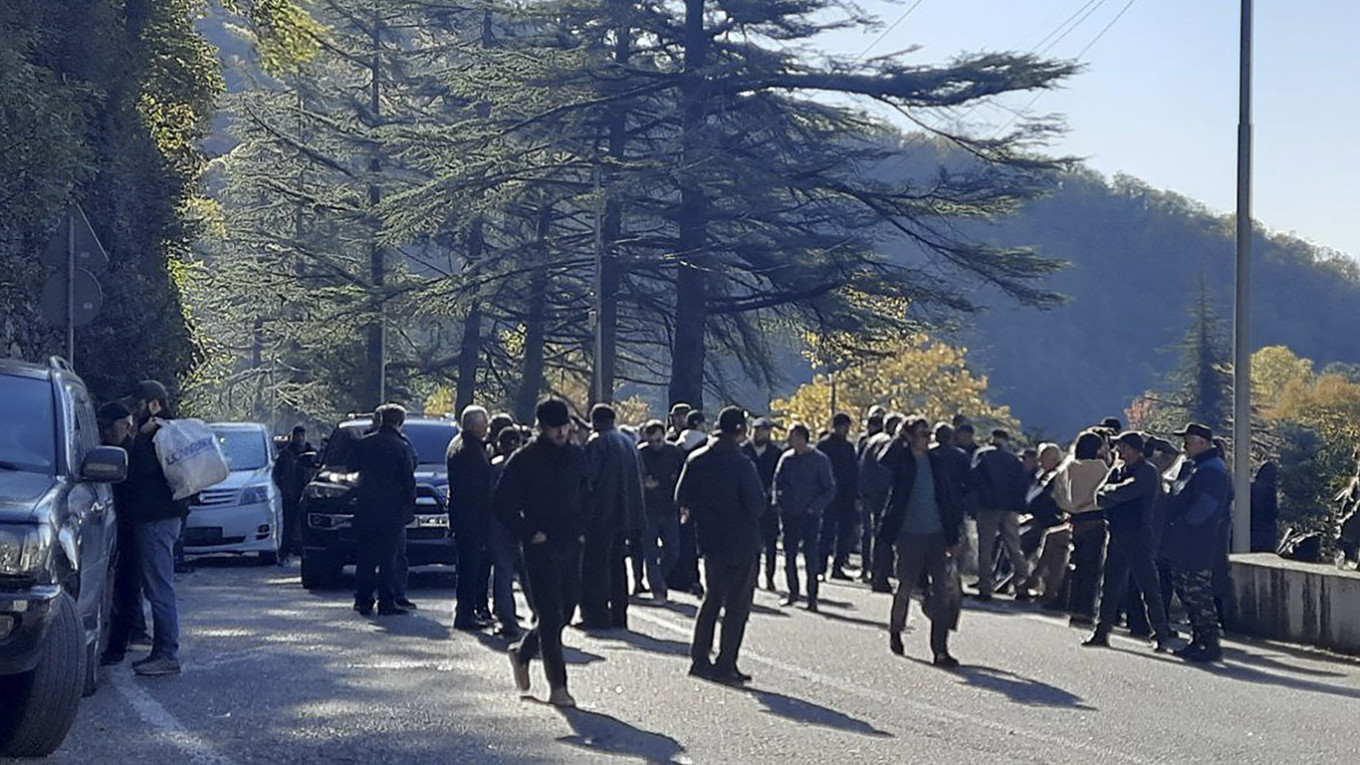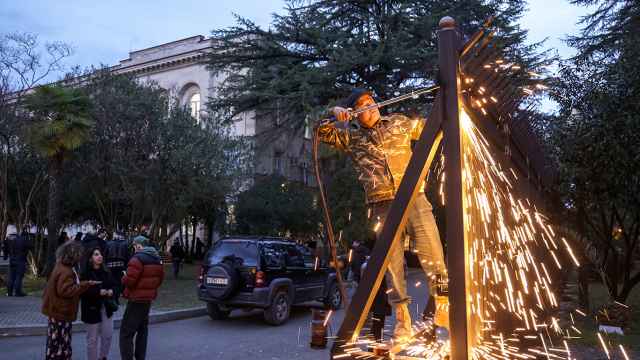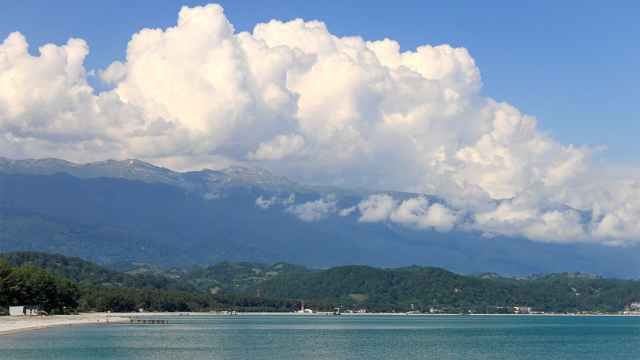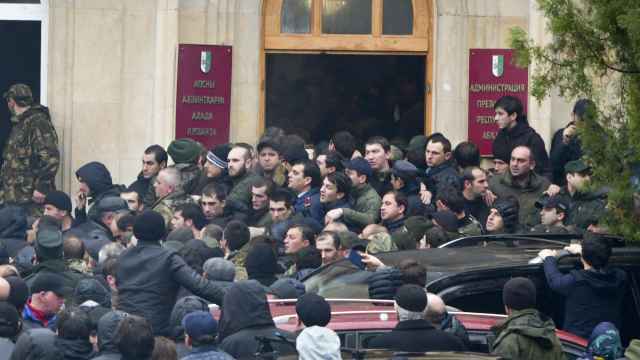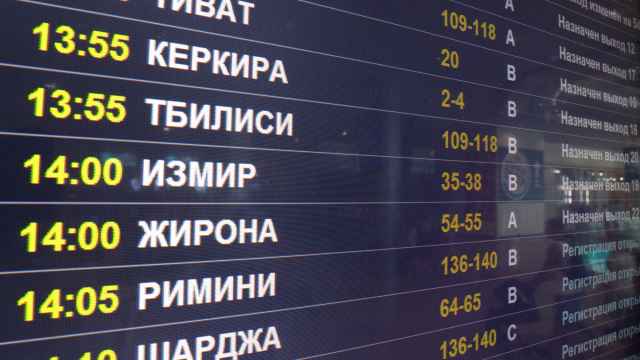Georgia’s breakaway Abkhazia region was rocked by protests this week after five activists opposing a controversial investment treaty with Russia were detained and held by security services.
Though all detainees were released on Tuesday after nearly 24 hours of protests, tensions persist as the region’s parliament is set to vote on ratification of the divisive treaty on Friday.
To make sense of the latest events in the volatile region and what Russia has to do with it, The Moscow Times has gathered all the latest news and expert commentary:
What is the treaty about?
Abkhazia’s Economic Minister Kristina Ozgan signed the investment agreement during the meeting with Russia’s Economic Development Minister Maxim Reshetnikov in Moscow last month.
Ozgan signed the treaty without the approval of Abkhazia’s parliament as required by law and despite widespread criticism of the agreement by parliamentary opposition and activists who dubbed it as harmful to the partially recognized state’s economic and security interests.
If ratified by the parliament, the treaty would offer various benefits to Russian investors in Abkhazia, including an eight-year tax and customs duty exemption.
“Their [the government’s] calculations are clear: to sign an agreement with the Russian side and push through its ratification in parliament by blackmailing [the opposition],” opposition leader Adgur Ardzinba was quoted as saying by independent news outlet JAM News.
What triggered the protests?
Opposition activists Omar Smyr, Garry Kokaia, Almaskhan Ardzinba, Ramaz Jopua and Aslan Gvaramia were arrested late on Monday when returning from Abkhazia’s coastal Gudauta district where they attended a public discussion about the controversial treaty, according to opposition politician Aslan Barcic.
Abkhazia’s Prosecutor General Adgur Agrba said that the five men were arrested on suspicion of "committing illegal acts” against a lawmaker, referring to a recent skirmish between them and deputy Almas Akaba that took place outside the parliament building in Sokhumi on Monday and was caught on camera.
Shortly after the news of the activists’ arrest broke out, hundreds of protesters gathered near the Abkhazian security services headquarters in Sokhumi to demand their release.
After trying to ram the main gate of the security services complex, the crowd moved on to the central Freedom Square.
By early morning on Tuesday, the protesters barricaded three key bridges in the city and a major highway, vowing not to stop the protest until all activists were released.
What did the local government do?
The region’s leader Aslan Bzhania called an emergency security council meeting amid the protests and assured the public that “Abkhazia’s security forces have enough power to ensure security and order in the country” in a statement released shortly after.
All activists were released Tuesday evening, the Russian state-run news agency TASS reported, citing opposition leader Ardzinba. The news agency also reported that a local court had dismissed the activists’ cases.
All roads in the city were unblocked by the protesters shortly after.
What is Russia’s role in this crisis?
With its pleasant subtropical climate and scenic nature, Abkhazia has become a popular travel destination for Russians whose beach vacation options became limited in the wake of the Kremlin’s invasion of Ukraine.
Russian nationals do not require international travel documents to enter the region and can cross the border by showing a domestic ID.
In 2024, around 1.4 million Russian tourists visited the small mountainous region with a population of just over 240,000 people, according to Russia’s Interfax news agency.
“Ever since…Russia recognized Abkhazia [as an independent state in 2008], there was always a demand from it to soften or change the local legislation to allow foreign citizens to purchase property and land,” said Olesya Vartanyan, an expert on security and conflicts in the South Caucasus.
“On the Abkhaz side, the main fear is that if they open up the region to Russians, then they would be literally swallowed by the Russian presence,” Vartanyan told The Moscow Times.
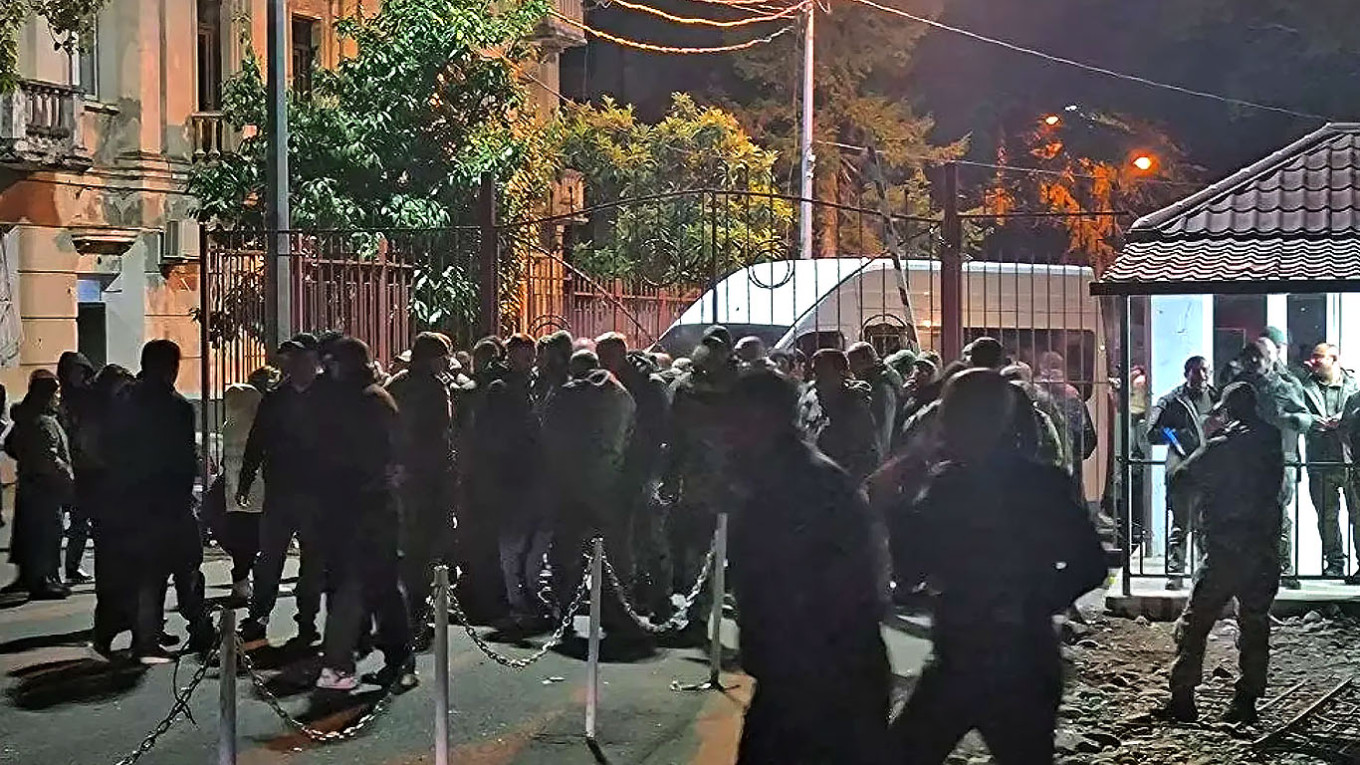
Over the past two years, Abkhazia’s Russia-backed leader Bzhaniya actively lobbied for the so-called “apartments bill,” which would open the real estate market of the Black Sea coast region to Russians by lifting the existing ban on foreign ownership of residential estate.
The bill’s initial approval by parliamentary committees sparked a wave of protests in the region earlier this year, leading to its eventual withdrawal from the parliament in July.
“Abkhazia is almost completely dependent on Russia…The degree of freedom it has to conduct an independent foreign policy, for example, as a breakaway unrecognized state is almost equal to zero,” said the head of the Tbilisi-based Democratic Security Institute Alex Scrivener.
“But despite it, some elements of its civil society have been remarkably successful in counterbalancing the direct Russian influence,” noted Scrivener, adding that even though the Kremlin treats Abkhazia as if it were a republic within its borders, that perception is not shared by the region’s vibrant civil society.
What’s next?
Though recent developments in Abkhazia might not be to Moscow’s liking, experts who spoke with The Moscow Times agree that the tensions are unlikely to escalate into a more widespread conflict or prompt Russian military intervention.
Scrivener noted that even though “things that happen in Abkhazia rarely escape the borders of that region,” people in the rest of Georgia — where the Russia-leaning Georgian Dream party won in parliamentary elections earlier this month — are watching the developments closely.
“They see that Abkhaz civil society in some ways is more able to stand up to Russian pressure than civil society in Tbilisi was able to [stand up to] its own government that passed Russian-style foreign influence law,” Scrivener told The Moscow Times, noting that Abkhazia’s government was forced to delay passage of a similar bill earlier this year amid growing pressure from the opposition.
But despite the opposition’s best efforts, Moscow still has an array of pressure mechanisms — including reducing economic aid and withdrawing security guarantees — to get what it wants from the tiny mountainous region.
“The current leadership is very much determined to meet the expectations of the Russian side one way or another,” said Vartanyan, adding that the tensions could “generate local protests or minor violent incidents.”
A Message from The Moscow Times:
Dear readers,
We are facing unprecedented challenges. Russia's Prosecutor General's Office has designated The Moscow Times as an "undesirable" organization, criminalizing our work and putting our staff at risk of prosecution. This follows our earlier unjust labeling as a "foreign agent."
These actions are direct attempts to silence independent journalism in Russia. The authorities claim our work "discredits the decisions of the Russian leadership." We see things differently: we strive to provide accurate, unbiased reporting on Russia.
We, the journalists of The Moscow Times, refuse to be silenced. But to continue our work, we need your help.
Your support, no matter how small, makes a world of difference. If you can, please support us monthly starting from just $2. It's quick to set up, and every contribution makes a significant impact.
By supporting The Moscow Times, you're defending open, independent journalism in the face of repression. Thank you for standing with us.
Remind me later.



